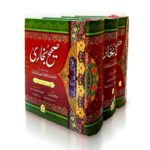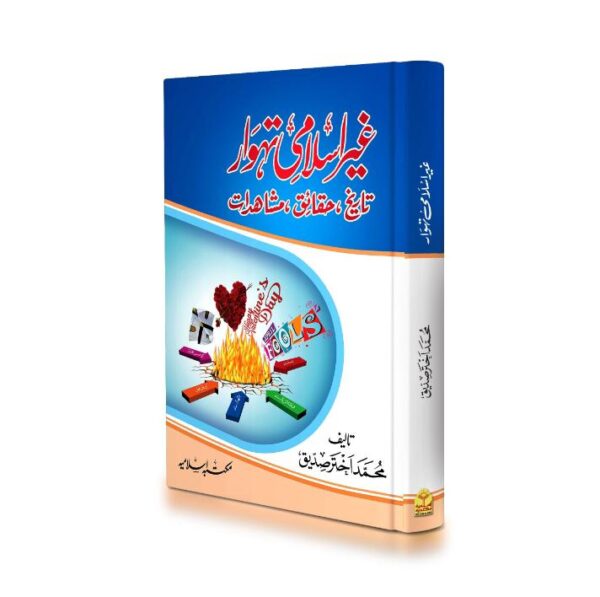Description
Ghair Islami Tehwar (Non-Islamic Festivals) refers to festivals and celebrations that are not part of Islamic tradition. These events often stem from cultural or religious practices outside of Islam and are widely celebrated in various societies across the globe. While Islam acknowledges the importance of celebrating events that have spiritual significance, such as Eid ul-Fitr, Eid ul-Adha, and the birth of Prophet Muhammad ﷺ (Mawlid), it does not endorse the celebration of non-Islamic festivals.
In Islam, the celebration of any festival, tradition, or ritual that is not rooted in Islamic teachings is generally discouraged, as it may lead to the incorporation of beliefs or practices that go against the principles of the faith. Many Islamic scholars agree that participating in or celebrating non-Islamic festivals can undermine one’s Islamic identity and values.
Examples of Ghair Islami Tehwar:
- Christmas (December 25): Christmas, celebrated by Christians as the birth of Jesus Christ (peace be upon him), is widely observed with various customs like exchanging gifts, decorating Christmas trees, and attending church services. While it holds religious significance for Christians, it is not an Islamic holiday, and participation in its celebrations is generally not recommended for Muslims, as it contradicts Islamic teachings about the nature of Jesus.
- New Year’s Eve (December 31): The celebration of the new year, marked by fireworks, parties, and festivities, is a secular event that does not have religious significance in Islam. The passing of time is acknowledged in Islam, but the celebration of a specific day to mark the new year is not part of the Islamic tradition. Muslims are encouraged to remember Allah and reflect on their actions every day, not just on a designated day.
- Valentine’s Day (February 14): Valentine’s Day, originally a Christian holiday celebrating love and romance, is observed by exchanging gifts, flowers, and messages of affection. In Islam, the celebration of romantic love outside the bounds of marriage is discouraged, and the concept of Valentine’s Day does not align with Islamic values.
- Halloween (October 31): Halloween is a popular Western festival where people dress up in costumes, participate in trick-or-treating, and celebrate spooky themes. Islam does not support the practices associated with Halloween, as they often involve superstitions, imitating non-Islamic rituals, or engaging in behavior contrary to Islamic ethics.
- Mother’s Day/Father’s Day: Although honoring parents is a fundamental value in Islam, the celebration of Mother’s Day and Father’s Day as commercialized events is not part of Islamic tradition. In Islam, showing love and respect to parents should be a daily practice and not confined to a single day of the year.
Islamic Perspective on Celebrating Non-Islamic Festivals:
- Shahada (Declaration of Faith): Islam is a complete way of life, and everything in a Muslim’s life should reflect their commitment to Allah and the teachings of Prophet Muhammad ﷺ. Celebrating non-Islamic festivals can divert one’s attention from these core principles.
- Avoiding Imitation of Non-Islamic Practices: The Prophet Muhammad ﷺ said, “Whoever imitates a people is one of them.” (Abu Dawood). This means that Muslims should avoid imitating practices that are not aligned with Islam, as it could lead to the adoption of foreign beliefs or ideologies.
- Maintaining Islamic Identity: By not participating in non-Islamic festivals, Muslims are better able to preserve their identity and avoid confusion about the principles of their faith. It is important for Muslims to distinguish themselves from practices that contradict their belief system.
Islamic Alternatives to Non-Islamic Festivals:
Instead of participating in Ghair Islami Tehwar, Muslims are encouraged to focus on religious occasions that strengthen their relationship with Allah, such as:
- Eid al-Fitr: A celebration of the end of Ramadan, a month of fasting and worship.
- Eid al-Adha: A festival commemorating the sacrifice of Prophet Ibrahim (Abraham) and his obedience to Allah.
- Mawlid al-Nabi: The celebration of the birth of Prophet Muhammad ﷺ, focusing on his teachings and character.
Muslims are also encouraged to regularly express love and gratitude to their families and communities, as Islam teaches the importance of nurturing relationships and showing kindness throughout the year.
Conclusion:
While non-Islamic festivals may be popular in many parts of the world, they are not part of Islamic tradition and are generally discouraged in Islam. Muslims are urged to focus on celebrations and rituals that strengthen their connection to Allah, follow the example of Prophet Muhammad ﷺ, and maintain their Islamic identity.









 Premium Stainless Steel Axe - Export Quality
Premium Stainless Steel Axe - Export Quality
Reviews
There are no reviews yet.